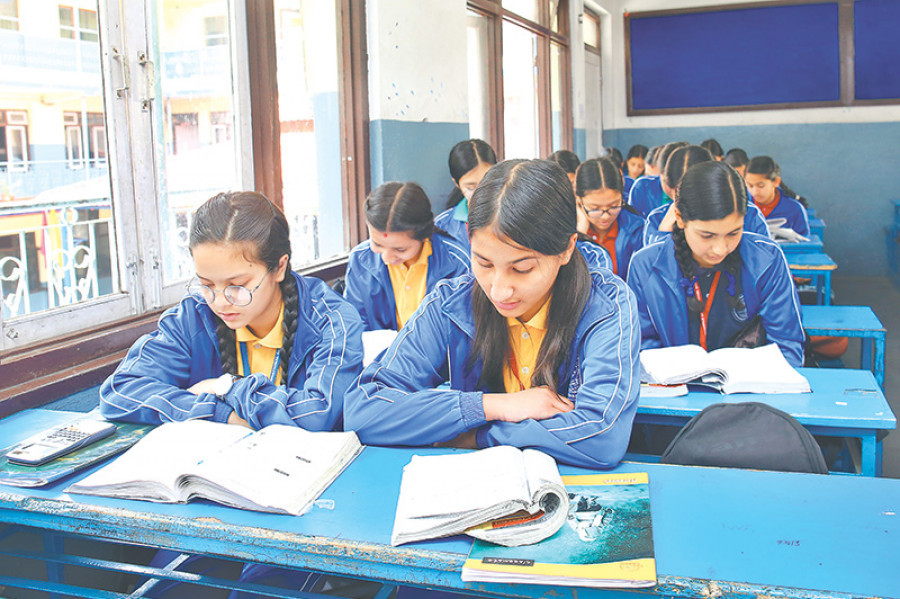National
Defying government’s directives and parliamentary committee’s order, private schools ask parents to pay tuition fees
Guardians’ association asks parents not to budge under pressure.
Binod Ghimire
Despite directives from a parliamentary committee and the government not to charge students for the lockdown period, associations of private schools have requested guardians to clear their ‘pending fees’.
The Private and Boarding Schools’ Organisation, Nepal and the National Private and Boarding Schools Association, Nepal on Sunday issued a joint statement requesting for the payment of fees for the month of Chaitra (March/April) and the following period saying that private schools have gone broke.
The two associations of private schools have also urged guardians to be present at schools and get their wards “registered” for the new school year. The registration, according to private school operators, means students’ annual admission.
The government has eased the lockdown since June 11 and allowed the operation of essential services but not the education sector. However, private schools say as they have already started alternative modes of instruction, they expect payment. The government on March 24 imposed a lockdown as a measure to contain the spread of Covid-19. All the schools and colleges have since been shut.
A month after the lockdown, the government asked for the waiver of tuition fees for a month. It also announced a soft loan if the schools were struggling with a shortage of funds to pay their teachers and cover other costs.
“Private schools will not charge their students for the months of Chaitra or Baisakh, except for boarding fees,” said Finance Minister Yubraj Khatiwada, also the government’s spokesperson, at a regular press briefing on April 29. “The government will provide a soft loan to a school if it has problems managing its expenses.”
The decision to waive school fees was part of the government's relief package to households hit hard by the restrictions. The private schools, however, were reluctant to follow the directives saying the measure was announced without consulting with them.
The Education and Health Committee of Parliament on May 7 also directed the schools not to admit students and charge tuition fees until the situation returns to normal. It asked the Ministry of Education to ensure that private academic institutions follow the directive.
“We have been providing alternative instruction and are committed to completing 192 days of schooling in the current academic session,” read the statement jointly issued by the two associations. The government has made it mandatory for schools to open for 220 days and engage students in teaching-learning activities for 192 days.
Though private schools have started charging fees for the alternative teaching, the government has ruled out virtual learning as a part of formal education, something parents are required to pay for.
The Education Ministry on June 1 issued directives for alternative learning, which came into effect on June 16. The ministry said it is just a means to anchor students in learning which will not be counted as forming schooling. Around 8,000 private schools are in operation across the country. According to the Education Ministry, of the 7 million school goers, 1.4 million attend private schools.
Ministry officials say their attention was drawn to the decision of private schools to demand fees and the call for admissions. “This is against our decision. Private schools are not allowed to pressurise guardians for it,” Tulashi Thapaliya, director general at the Centre for Education and Human Resource Development, told the Post.
Issuing a statement on Monday evening, the Education Ministry said, “A serious attention has been drawn to the call of two private school organisations to pay tuition fees. The government will hold a dialogue to resolve problems facing privately run academic institutions.”
Guardians say the private schools, defying the government’s directives, are building pressure on them to pay. Keshav Puri, chairperson of the Guardians Association Nepal, said some schools started calling up parents since last month, asking them to admit their children.
“Now two associations have openly challenged the government. We have asked our members to reject the call from schools,” he told the Post. The tendency of the government to make announcements but not enforcing them has emboldened private schools, Puri said.
Student unions have also asked the school associations to withdraw their decision saying that it would be an undue burden on the people who are already hit by the pandemic hard.
“We warn private schools not to take the pandemic as an opportunity to make money,” said All Nepal National Independent Student’s Union, affiliated to the ruling Nepal Communist Party (NCP), in a statement.




 15.12°C Kathmandu
15.12°C Kathmandu















